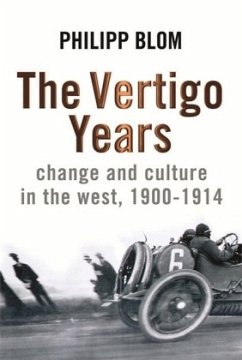Europe, early in the twentieth century: a world adrift, a pulsating era of creativity and contradictions. The hot topics of the day - terrorism and globalisation, immigration, consumerism, the lack of moral values and rivalling superpowers - could make one forget that it is a century ago that this era vanished in the trenches of the Somme, of Ypres, and of Passchendaele. Or did it? The closer one looks, the more this world seems like ours: feminism and quantum thedory, atonal music and democratisation, mass communication and commercial branding, genetics, state-sponsored genocide, colonialism, consumerism and racism, radioactivity and psychoanalysis are all terms first used during this period. This was a time radically unlike the Victorian era that preceded it, a time in which old certainties broke down and many people lost their bearings. At the heart of this vibrant Europe, was a contradiction that would cause its collapse: the new, modern world of mass production, urban life, technological warfare and a rapidly growing working class was still ruled by men - Kaiser Wilhelm, Tsar Nicolas II, and the Austro-Hungarian Emperor Francis Joseph among them - who thought in the chivalric and paternalistic categories of earlier generations, prefering the image of dashing cavalry officers to the prosaic slaughter of the machine gun, and national mythology to political cohesion and democracy. The eventual scope of the catastrophe often obscures the fact that the great cultural divide in Europe's history lies before 1914. This book will bring to life the immediacy of the lives and issues of this fascinating and flawed period.

Sturm
Für die im 19. Jahrhundert Geborenen waren die letzten 14 Jahre vor Ausbruch des Ersten Weltkriegs 1914 die „goldene Zeit“. Das Urteil verdankte sich einem verklärten Blick auf eine Zeit, die Philipp Blom in einer anspruchsvollen, sehr gut lesbaren historischen Kolportage geschildert hat. Jedem Jahr dieser letzten Frist des Friedens vor dem großen Krieg hat Blom ein Kapitel gewidmet. Am Anfang steht die Pariser Weltausstellung von 1900, die ein Emblem war für den Optimismus, mit dem die Menschen das neue Jahrhundert begrüßten. Hier kündigte sich an, was in den nächsten Jahren eine ungeheure Dynamik auslöste, die das Leben der Menschen und ihren Blick auf die Welt veränderten. Die Folgen davon zeigten sich nicht nur an den wissenschaftlichen Entdeckungen, sondern auch an sozialen künstlerischen und politischen Entwicklungen, die das 20. Jahrhundert prägten. Johannes Willms
Philipp Blom:
Der taumelnde Kontinent. Europa 1900-1914.
dtv, München 2011.
528 Seiten,
14,90 Euro.
SZdigital: Alle Rechte vorbehalten - Süddeutsche Zeitung GmbH, München
Jegliche Veröffentlichung und nicht-private Nutzung exklusiv über www.sz-content.de
